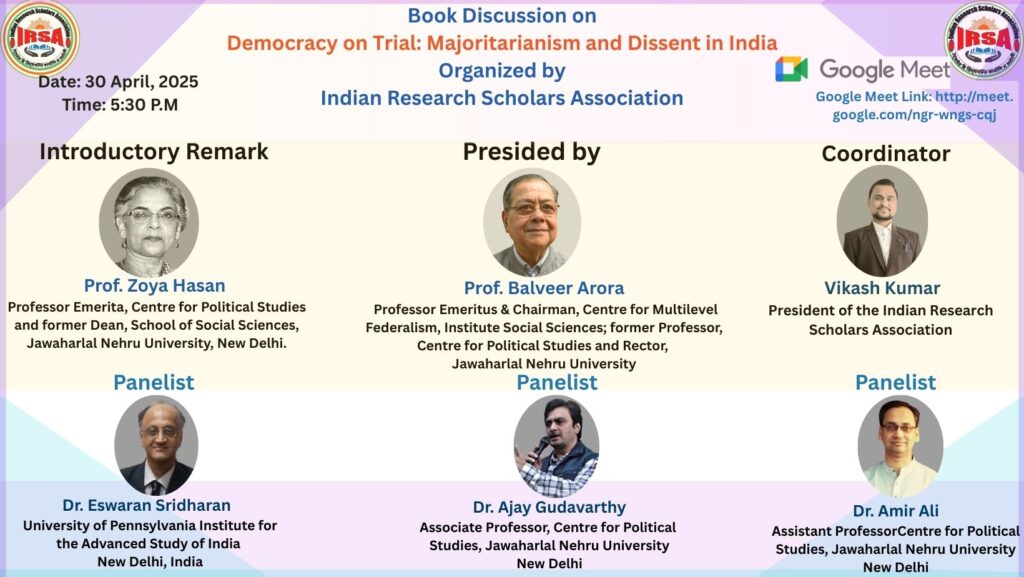Book Discussion on Democracy on Trial: Majoritarianism and Dissent in India, 30 April 2025: Time, 5:30 P.M
Indian Research Scholars Association
Organizing
Book Discussion on
Democracy on Trial: Majoritarianism and Dissent in India
30 April 2025: Time, 5:30 P.M
Introductory Remark: Prof. Zoya Hasan, Professor Emerita, Centre for Political Studies and former Dean, School of Social Sciences, Jawaharlal Nehru University, New Delhi.
Presided by: Prof. Balveer Arora, Professor Emeritus & Chairman, Centre for Multilevel Federalism, Institute of Social Sciences; former Professor, Centre for Political Studies and Rector, Jawaharlal Nehru University
Panelist: Dr. Ajay Gudavarthy, Associate Professor, Centre for Political Studies, Jawaharlal Nehru University, New Delhi
Panelist: Dr. Amir Ali, Assistant Professor, Centre for Political Studies, Jawaharlal Nehru University, New Delhi
Organising Committee Members
Vikash Kumar, President of the Indian Research Scholars Association
Dr. Hemant Kumar, Post Doctoral Fellow, Jawahar Lal Nehru University, New Delhi
Ganeshi Lal, Research Scholar, Jawahar Lal Nehru University, New Delhi
Rimlee Kalita, Research Scholar, Rajiv Gandhi University, Arunachal Pradesh
Mrs. Asha Rajpurohit, Assistant Professor Government College, Sailana
Manorama Kuntal Department of Political Science Jamia Millia Islamia
Sakshi Singh, Research Scholar, Faculty of Education, Banaras Hindu University, Kashi, BHU
Shubhangi Amble, Research Scholar Dr. Babasaheb Ambedkar Marathwada University, Maharashtra
Aaysha Zameer, Jamia Millia Islamia New Delhi
Anurag Yadav, Research Scholar, School of Law, Pondicherry University, Puducherry
Papi Halder, Ph.D. Scholar, Lucknow University
Sunita V Yadav, Research Scholar at D.T.S.S COLLEGE Mumbai Maharashtra
Arpanpreet Kaur, Research Scholar, Central University of Punjab
Sunita V Yadav, Research Scholar at D.T.S.S COLLEGE, Mumbai, Maharashtra
Naina Prasad, Research Scholar, Mahatma Gandhi International Hindi Vishwavidyalaya, Wardha
Cover Page of the Book
Brief About the Book: Brief About the Book: This book has been written by Zoya Hasan in 2024 which has been published by Aakar Publication. Three shifts have shaped Indian politics in the current conjuncture – consolidation of a majoritarian brand of politics, decline in the autonomy of institutions and curbs on dissent and opposition. At the heart of these changes lies the politics of the ruling party fuelled by the Hindu majoritarian project and a move away from pluralism. The very idea of a democracy based on equal rights irrespective of caste, class or faith has changed under the pressure of majoritarian politics. This combined with the declining independence of institutions and the dilution of checks and balances has contributed to democratic erosion. This book ties to make sense of these changes by focussing on two overlapping developments- the expansion of a majoritarian politics and the shrinking space for dissent and pluralism in the past decade. It unpacks the implications and consequences of these developments in five areas – dissent, media, rights, protests, and opposition.
About The Author
Prof. Zoya Hasan is a National Fellow, Indian Council of Social Science Research. She has been a former Professor of Political Science and the Dean of the School of Social Sciences at Jawaharlal Nehru University, New Delhi, and a former member of the National Commission for Minorities. Prof. Hasan’s work has focused on the state, political parties, ethnicity, gender, minorities in India, and society in North India. Known for her path-breaking work on the politics of Uttar Pradesh, she has also undertaken extensive research on the social and educational aspects of Indian Muslims and Muslim women. Her interest in Indian Government and politics, the State party system, political mobilisation, minority rights, and gender studies is reflected in her various research studies and books. Amongst her many books she has authored, Congress after Indira: Policy, Power and Political Change (1984-2009), Democracy and the Crisis of Inequality: Collection of Essays, Politics of Inclusion: Castes, Minorities and Affirmative Action, Democracy in Muslim Societies: The Asian Experience, and India’s Living Constitution: Ideas, Practices, Controversies. Along with Mushirul Hasan, she co-edited CSD’s publication, India: Social Development Report – 2012, Minorities at the Margins. She is currently completing a monograph for the ICSSR National Fellowship on Social Movements and State Action. Prof. Hasan holds a PhD from Pennsylvania State University. Hasan has also done extensive policy work pertaining to higher education and minorities. She was a Member of the National Commission for Minorities, National Integration Council, National Book Trust, National Monitoring Committee for Minorities Education (NMCME) and a member of the Working Group on Higher Education, Twelfth Five Year Plan, Ministry of Human Resources and Development. She was Chairperson of the Eleventh Five Year Working Group on Empowering the Minorities, Co-Chair of the Central Advisory Board of Education (CABE) Committee on Regulatory Mechanism for Textbooks in Government and Non-Government Schools, and Member of the High-Level Committee of the Ministry of Human Resources and Development (MHRD) to develop a plan of action for implementation of Sachar Committee recommendations on Education. Prof. Hasan has published widely on Indian politics, democracy, state-society relations, politics of representation, public protests, and more broadly on issues of equality, social justice, and minorities. Her most recent publications are When People Rise in Protest: Mobilising for Equal Citizenship in India (co-authored), Democracy and Trial: Majoritarianism and Dissentin India; Ideology and Organizationin Indian Politics: Polarisation and the Growing Crisis of the Congress Party 2009-2019, Agitation to Legislation: Negotiating Equity and Justice in India, Politics of Inclusion: Caste, Minority and Affirmative Action; Congress After Indira: Policy, Power Political Change 1984-2009. Her edited works include Equalising Access: Affirmative Action in Higher Education in India, United States and South Africa (coedited); Parties and Party Politics in India, Democracy and Muslim Societies: The Asian Experience; Diversity of Muslim Women’s Lives in India (coedited).
Kindly reach out us at:
Website: www.irsa.org.in
Youtube Link: https://www.youtube.com/@IRSAconversations/about
Facebook\page:facebook.com/profile.php id=100089905803854&mibextid=ZbWKwL
WhatsappLink: https://chat.whatsapp.com/H923mD2xt3N0zu2D19aFpH
TwitterLink:https://twitter.com/research13613/status/1717121881047027889/photo/1
Linkedin:https://www.linkedin.com/in/indian-research-scholars-assocaition-76503b297/
Google Meet Link: http://meet.google.com/ngr-wngs-cqj
Gmail:irsa.ac.in121@gmail.com
About the Indian Research Scholars Association: The India Research Scholars Association is a platform whose objective is to exchange creative, constructive, promotional, and progressive dialogue with research scholars in all the universities, colleges, and research institutes of India doing research in the subjects of Social Sciences, Humanity, Commerce and Management. Through this platform, subject experts’ lectures are organized, and information related to research is shared. Lectures have been organized on research methodology, contemporary issues, research dynamics, and topics. The Researchers doing research in various universities, colleges, and research institutes operate this platform. Whose selection is made according to work done in their particular field? In this, lectures related to research are organized by subject experts and research scholars. So that the flow of logic and language can be developed in their works and communication style, this platform welcomes all those research scholars of India who are active in Research work.
Mission:
Our primary mission is to empower researchers, academicians, and students by providing them with the necessary tools, guidance, and platforms to excel in their academic pursuits. We believe in sharing knowledge free of cost because knowledge is for sharing, not for sale. We aim to foster a community that values knowledge sharing, interdisciplinary collaboration, and the development of cutting-edge research methodologies. IRSA aims to connect research scholars on one platform to exchange creative, constructive, promotional, and progressive dialogue with research scholars in all the universities, colleges, and research institutes of India.
Achievements: Our first major achievement is successfully bringing researchers from across the country together on a single platform. With a proven track record of organizing successful events, including two 10-day workshops on ‘Data Analysis Using SPSS Software’ and a one-week national-level e-workshop on ‘Enhancing Research Paper Writing Skills’. We have garnered a large number of participation from leading academicians, researchers, and students across India. Our lecture series, workshop and also book discussion sessions have been successful in reaching every state and UTs of our country. Consequently, 3000+ young researchers have connected with IRSA from all over India on various social media platforms. Delegates from various countries like the USA, France, Germany, Russia, and Bangladesh have visited this virtual platform and shared their knowledge and experiences. We have successfully conducted 200+ lectures, 30+ book discussions, and three workshops with the participation of vice-chancellors, professors, researchers, and professionals. These sessions have provided a platform for insightful discussions on topics such as key concepts of research methodology, how to develop a questionnaire, how to avoid mistakes during research, hypothesis testing, and many more; book discussions on various contemporary issues like Reimagining Innovation Systems in Covid and Post Covid, Globalization and Sustainable Development, Internal Security and so on have received positive feedback for their depth and relevance.

